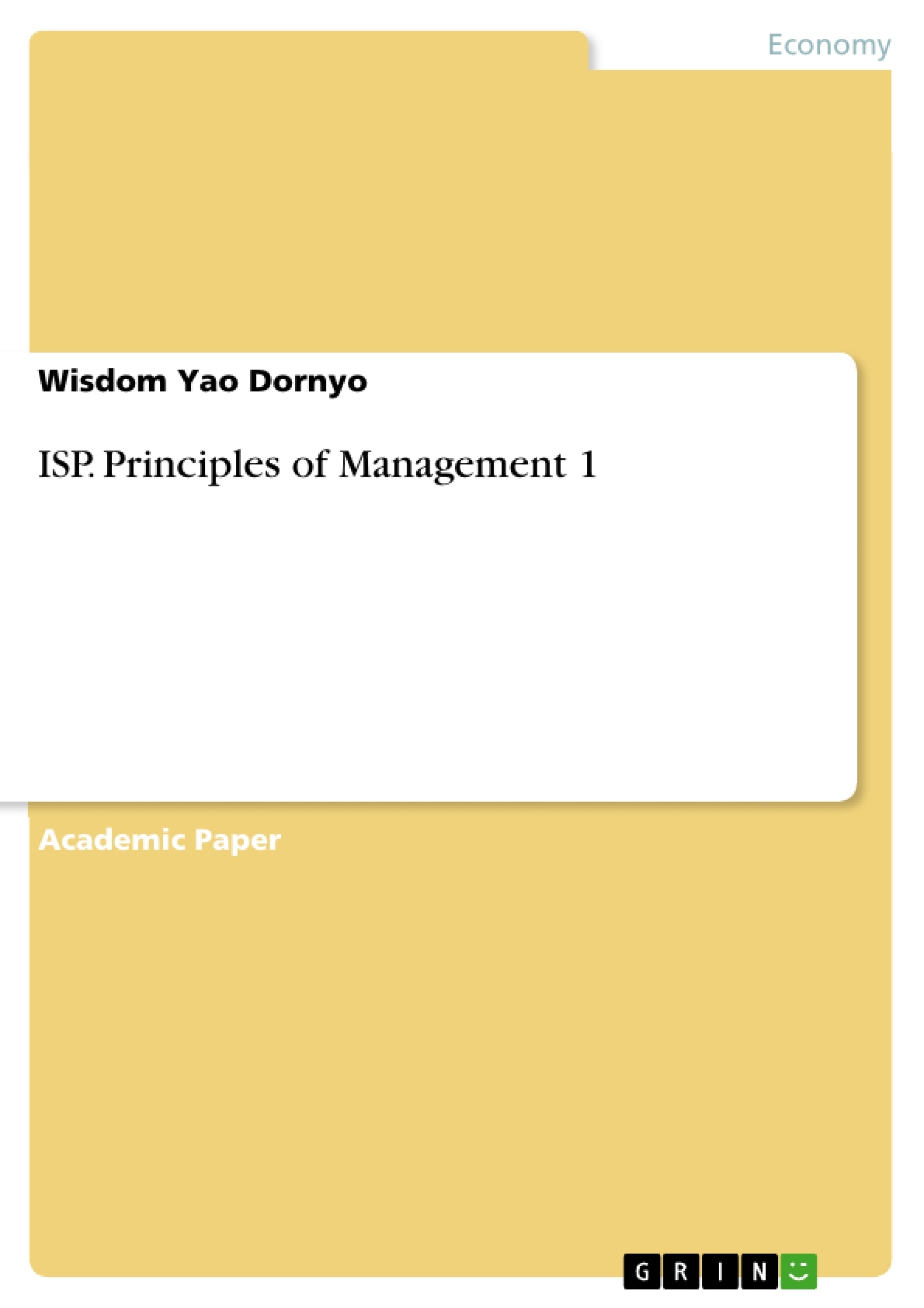The ISP is made up of topics that could be seen among other topics in the table of content above. They are to be completed respectively making up to about 20 pages in all. Deep and thorough review of several literatures that were searched mostly over the internet has been utilized with consideration of each topic or area in different perspectives. I have tried to connect different views under a topic just to broaden the scope of each material.
References could be seen at the foot of most pages for easy tracing of sources of materials. Considerable care has been exercised to make points as clear as possible. Quotes have been well revised repeatedly in order to draw down to their appropriate applications to the point they were meant to clarify and make. Where I constructed diagrams for use, I have appropriately referred them. In fact, this paper in totality, is a real coverage of quite a high percentage of materials covering each topic and could be as well as deemed fit for academic references by whoever might be aspiring to such a task.
Inhaltsverzeichnis (Table of Contents)
- General introduction
- Strategic lenses (1. design lens, 2. experience lens, and 3. idea lens)
- The Design Lens
- Experience Lens
- Idea Lens
- Other Schools of Thought
- Summary
- Dynamic capabilities
- Procedure
- Performance
- Reconfiguring
- Further view on dynamic capabilities
- Exploration
- Exploitation
- Summary
- Managing diversity
- A Holistic Model of Total Quality Diversity (TQD)
- What Makes a Company Multicultural?
- Leadership
- Initiatives
- Recruitment
- Promotion
- Retention
- Evaluation
- Disadvantages of the literatures on diversity
- Diversity of thought
- The Work Place
- Organizational Differences
- Confidence at the Work Place
- Freedom of Expression
- Willingness
- Readiness
- Opportunity
- Importance of developing trust in management situations
- Results from trust
- Activities due to management to build trust
- Sensing trust
- Managing boundary-less organizations
- Job Analysis
- Boundaryless Recruitment
- Boundaryless Job Selection
- Effective management (how to effectively make management work)
- Participatory Styles
- Directing Styles
- Teamwork Style
- Manager as a Planner
- Manager as a Provider
- Protector
- Vision
- Other Qualities
- Peter Drucker and the essentials of management
- Overall sum up
Zielsetzung und Themenschwerpunkte (Objectives and Key Themes)
This paper aims to provide a comprehensive overview of the principles of management, drawing on a wide range of literature and exploring key areas within the field. It seeks to establish a solid foundation for understanding the core concepts and practices of effective management.
- The importance of strategic lenses and their impact on organizational success
- Dynamic capabilities and their role in managing change and innovation
- The challenges and benefits of managing diversity in the workplace
- The crucial role of trust in building effective management relationships
- The evolution of organizational structure and the rise of boundaryless organizations
Zusammenfassung der Kapitel (Chapter Summaries)
The paper begins by defining the concept of strategic lenses, highlighting the design, experience, and idea lenses. The design lens emphasizes careful analysis and logical determinism in strategy development, while the experience lens emphasizes continuous adaptation based on past experiences. The idea lens promotes innovative thinking and flexibility in decision-making, often utilizing a bottom-up approach.
The paper then delves into dynamic capabilities, exploring their role in managing change and adapting to rapidly evolving environments. It examines procedures, performance, and reconfiguration processes within organizations, emphasizing the importance of both exploration (seeking new opportunities) and exploitation (optimizing existing strengths).
The paper explores the concept of managing diversity, highlighting the importance of creating a diverse workforce and fostering an inclusive work environment. It outlines key elements of managing diversity, such as leadership, initiatives, recruitment, promotion, retention, and evaluation.
The paper further examines the critical role of trust in management situations, emphasizing the benefits of building strong relationships based on commitment, companionship, and competence. It explores the importance of trust for effective communication, risk management, and overall organizational performance.
Finally, the paper discusses the evolution of organizational structure and the emergence of boundaryless organizations, which are characterized by their emphasis on interdependency, trust, and the free flow of ideas and information. It explores how these organizations approach job analysis, recruitment, and selection processes.
Schlüsselwörter (Keywords)
Strategic lenses, design lens, experience lens, idea lens, dynamic capabilities, managing diversity, diversity of thought, trust, boundaryless organizations, effective management, Peter Drucker, management essentials.
Frequently Asked Questions
What are the three "Strategic Lenses" in management?
They are the design lens (logical analysis), the experience lens (adaptation based on the past), and the idea lens (innovation and bottom-up flexibility).
What is meant by "Dynamic Capabilities"?
It refers to an organization's ability to integrate, build, and reconfigure internal and external competences to address rapidly changing environments.
What makes a company truly multicultural?
A multicultural company integrates diversity in leadership, recruitment, and promotion, fostering an environment where different perspectives are valued.
How can managers build trust in a team?
Trust is built through consistent communication, demonstrating competence, showing commitment to employees, and fostering freedom of expression.
What is a "Boundaryless Organization"?
It is an organizational structure that minimizes traditional barriers between departments and levels, emphasizing interdependency and free information flow.
- Quote paper
- Wisdom Yao Dornyo (Author), 2010, ISP. Principles of Management 1, Munich, GRIN Verlag, https://www.grin.com/document/520205



